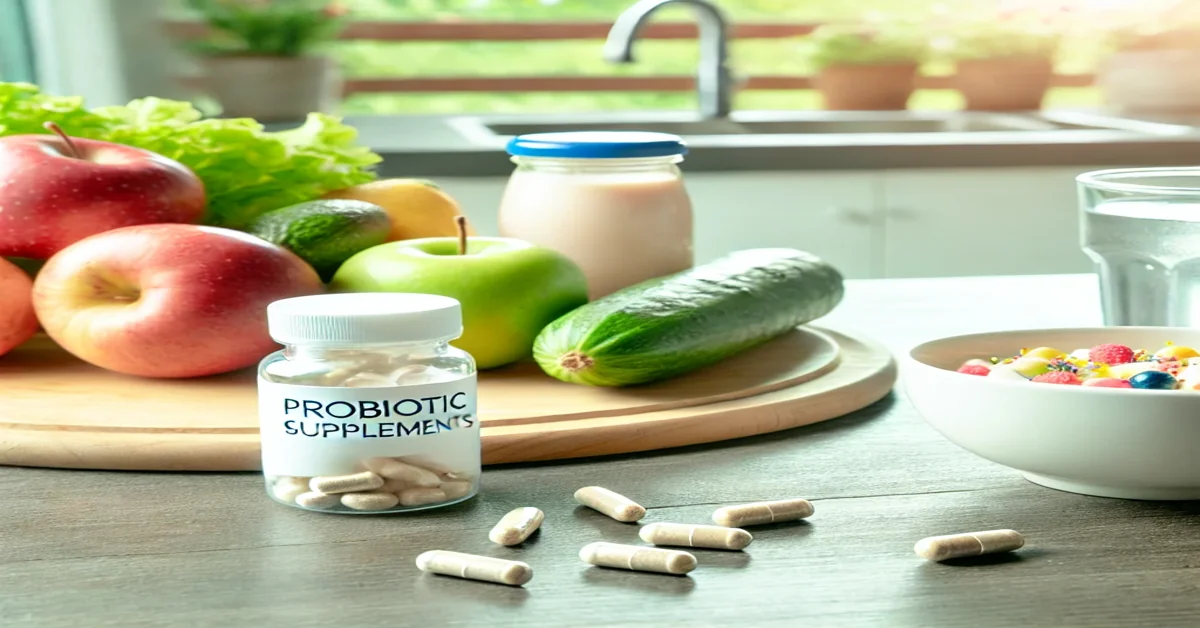Maintaining good digestive health is essential for overall well-being. While many factors contribute to a healthy digestive system—such as a balanced diet, regular exercise, and hydration—probiotics have gained attention for their significant role in supporting gut health. Probiotic supplements are one of the most popular ways people boost their gut microbiome, but how to pick the best probiotic supplement, how do they actually work, and what are probiotic supplement benefits for your digestive health?
What Are Probiotics?
Probiotics are live bacteria and yeasts that are beneficial for your digestive system. While the term “bacteria” often has a negative connotation, probiotics are the “good” bacteria that help keep your gut healthy. They naturally exist in your digestive tract and are also found in fermented foods like yogurt, kefir, sauerkraut, and kimchi. However, probiotic supplements offer a more concentrated and consistent source of these beneficial microorganisms.
The main goal of probiotics is to maintain a balanced gut microbiome—a community of trillions of bacteria, both good and bad, that reside in your intestines. When the balance of these bacteria is disrupted (due to poor diet, stress, antibiotics, or illness), digestive issues like bloating, gas, diarrhea, and constipation can occur. Probiotic supplements help restore the balance by replenishing the good bacteria.
How Probiotics Improve Digestive Health
Probiotics provide numerous benefits for the digestive system. Here’s a closer look at how they support gut health and help improve digestion:
1. Restoring Gut Balance
One of the primary benefits of probiotics is their ability to restore balance in the gut microbiome. When you take antibiotics, for instance, they not only kill the harmful bacteria causing an infection but also eliminate the good bacteria in your gut. This disruption can lead to digestive issues like diarrhea and bloating. Probiotic supplements can help replenish these good bacteria, restoring balance and promoting smoother digestion.
Probiotics also help in cases of dysbiosis, an imbalance between good and bad bacteria in the gut, which can contribute to digestive disorders such as irritable bowel syndrome (IBS) and inflammatory bowel disease (IBD). Research shows that taking probiotics can alleviate symptoms of these conditions, such as abdominal pain, bloating, and irregular bowel movements.
2. Improving Bowel Regularity
Constipation and irregular bowel movements are common digestive complaints. Probiotic supplements can improve bowel regularity by enhancing the movement of food and waste through the digestive tract. Certain strains of probiotics, such as Bifidobacterium and Lactobacillus, are particularly effective at promoting healthy bowel movements.
These probiotics work by increasing the production of short-chain fatty acids (SCFAs) in the gut, which stimulate the muscles of the intestines to move waste along more efficiently. As a result, probiotics can help reduce constipation and promote more regular, healthy bowel movements.
3. Boosting Nutrient Absorption
A healthy gut is key to optimal nutrient absorption. Probiotics improve the digestive process by helping your body break down food more efficiently and absorb essential nutrients such as vitamins, minerals, and amino acids. Certain strains of probiotics produce digestive enzymes that break down complex carbohydrates, proteins, and fats, making it easier for your body to absorb the nutrients from the food you eat.
When your gut is healthy, your body can better absorb vitamins such as B12, magnesium, and calcium, which are essential for energy, bone health, and overall wellness. By improving digestion, probiotics not only benefit your gut but also support your overall nutritional status.
4. Reducing Symptoms of Digestive Disorders
Probiotic supplements have been shown to help manage symptoms of various digestive disorders, including irritable bowel syndrome (IBS), ulcerative colitis, and Crohn’s disease. People with IBS often experience uncomfortable symptoms such as bloating, gas, and irregular bowel movements, which can be difficult to manage.
Studies suggest that probiotic strains like Lactobacillus plantarum and Bifidobacterium infantis can help reduce bloating, improve stool consistency, and minimize abdominal discomfort in people with IBS. Similarly, probiotics have been found to support the health of people with ulcerative colitis and Crohn’s disease by reducing inflammation in the gut lining.
Types of Probiotics to Look For
Not all probiotics are the same, and different strains offer different benefits. When choosing a probiotic supplement, it’s important to look for specific strains that target your digestive concerns. Here are some of the most common types of probiotics known for improving digestive health:
- Lactobacillus Acidophilus: Helps break down lactose and reduce symptoms of lactose intolerance. It’s also effective for relieving diarrhea.
- Bifidobacterium Longum: Supports the immune system and promotes regular bowel movements. It’s particularly helpful for people with IBS.
- Saccharomyces Boulardii: A beneficial yeast that helps treat diarrhea and reduce inflammation in the gut, often used for managing symptoms of IBD.
- Lactobacillus Plantarum: Known for reducing bloating and gas, this strain is commonly used by people with IBS.
By understanding which probiotic strains best suit your needs, you can choose a supplement that offers the most targeted benefits.
Incorporating Probiotic Supplements Into Your Routine
Taking a probiotic supplement is a simple and effective way to support your digestive health. Probiotics are available in various forms, including capsules, powders, and even gummies. To get the best results, look for a supplement with multiple strains of probiotics and a high colony-forming unit (CFU) count. Aim for at least 10-50 billion CFUs per serving for optimal digestive support.
If you’re not sure if you should take probiotic supplements, look for some symptoms of probiotic deficiency in your body.
For best results, take your probiotic supplement consistently, ideally with a meal to help the bacteria survive the journey through your digestive tract. If you’re new to probiotics, start with a lower dose and gradually increase to avoid any initial digestive discomfort.
In a world where digestive issues are common, adding a probiotic supplement to your routine may just be the key to achieving better gut health and long-lasting digestive comfort.









